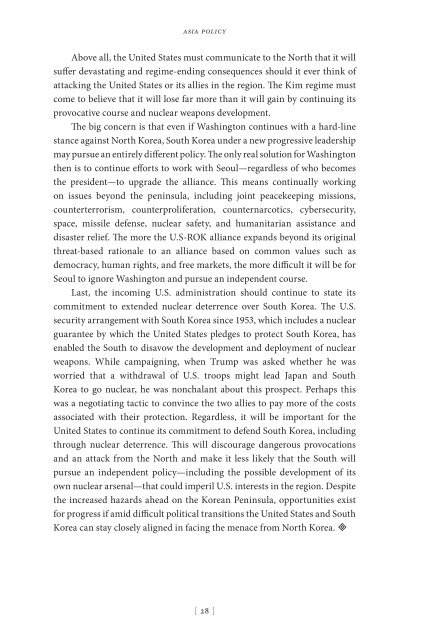2jBVKVf
2jBVKVf
2jBVKVf
You also want an ePaper? Increase the reach of your titles
YUMPU automatically turns print PDFs into web optimized ePapers that Google loves.
asia policy<br />
Above all, the United States must communicate to the North that it will<br />
suffer devastating and regime-ending consequences should it ever think of<br />
attacking the United States or its allies in the region. The Kim regime must<br />
come to believe that it will lose far more than it will gain by continuing its<br />
provocative course and nuclear weapons development.<br />
The big concern is that even if Washington continues with a hard-line<br />
stance against North Korea, South Korea under a new progressive leadership<br />
may pursue an entirely different policy. The only real solution for Washington<br />
then is to continue efforts to work with Seoul—regardless of who becomes<br />
the president—to upgrade the alliance. This means continually working<br />
on issues beyond the peninsula, including joint peacekeeping missions,<br />
counterterrorism, counterproliferation, counternarcotics, cybersecurity,<br />
space, missile defense, nuclear safety, and humanitarian assistance and<br />
disaster relief. The more the U.S-ROK alliance expands beyond its original<br />
threat-based rationale to an alliance based on common values such as<br />
democracy, human rights, and free markets, the more difficult it will be for<br />
Seoul to ignore Washington and pursue an independent course.<br />
Last, the incoming U.S. administration should continue to state its<br />
commitment to extended nuclear deterrence over South Korea. The U.S.<br />
security arrangement with South Korea since 1953, which includes a nuclear<br />
guarantee by which the United States pledges to protect South Korea, has<br />
enabled the South to disavow the development and deployment of nuclear<br />
weapons. While campaigning, when Trump was asked whether he was<br />
worried that a withdrawal of U.S. troops might lead Japan and South<br />
Korea to go nuclear, he was nonchalant about this prospect. Perhaps this<br />
was a negotiating tactic to convince the two allies to pay more of the costs<br />
associated with their protection. Regardless, it will be important for the<br />
United States to continue its commitment to defend South Korea, including<br />
through nuclear deterrence. This will discourage dangerous provocations<br />
and an attack from the North and make it less likely that the South will<br />
pursue an independent policy—including the possible development of its<br />
own nuclear arsenal—that could imperil U.S. interests in the region. Despite<br />
the increased hazards ahead on the Korean Peninsula, opportunities exist<br />
for progress if amid difficult political transitions the United States and South<br />
Korea can stay closely aligned in facing the menace from North Korea. <br />
[ 28 ]


